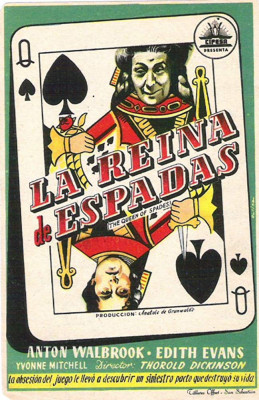| Reviews & Columns |
|
Reviews DVD TV on DVD Blu-ray 4K UHD International DVDs In Theaters Reviews by Studio Video Games Features Collector Series DVDs Easter Egg Database Interviews DVD Talk Radio Feature Articles Columns Anime Talk DVD Savant Horror DVDs The M.O.D. Squad Art House HD Talk Silent DVD
|
DVD Talk Forum |
|
|
| Resources |
|
DVD Price Search Customer Service #'s RCE Info Links |
|
Columns
|
|
|
Queen of Spades, The
Its renewed status is a bit misleading. Adapted from Alexander Pushkin's 1834 short story, already an 1890 opera by Tchaikovsky, The Queen of Spades certainly has a few very effective flashes of horror near the end, but mostly it's a gorgeously photographed literary adaptation. While certainly in the same league as Dead of Night, the two pictures are nothing alike beyond their handsome production values. In some respects, Queen of Spades reminds the viewer of the horror-like scenes in David Lean's Great Expectations (1946) and Oliver Twist (1948), with flashes of Max Ophüls. In other ways, it anticipates the later films of Italian Mario Bava, whose contributions to the horror genre were heavily influenced by Russian writers like Pushkin.
Directed by the unheralded Thorold Dickinson - I hadn't heard of him before, either - the movie is mostly a one-of-a-kind masterpiece. (Dickinson's best films are generally considered this one, the original British, not MGM, version of Gaslight, and 1952's Secret People, the movie that helped launch the career of Audrey Hepburn.) It's a difficult film to describe let alone review partly because its best assets are not-quite-like anything else in British cinema.
In 1806 St. Petersburg, Herman Suvorin (Anton Walbrook) is a captain in the army but, because of his working-class background, out of his league carousing with fellow officers, all titled men from rich families, including Andrei (Ronald Howard, lookalike son of actor Leslie), Fyodor (Anthony Dawson), and even comical Hovaisky (Michael Medwin).
At a local drinking hole (and perhaps brothel), with its boisterous Gypsy entertainment, the men gamble their pay away on the card game Faro. Except Suvorin, that is, who attracts attention by intensely studying the game but never gambling any money. At a bookshop he buys a volume chronicling locals tales of the supernatural, including one about young Countess Ranevskaya (Pauline Tennant), who decades before sold her soul to the devil in exchange for three key cards that would win her a fortune at Faro.
Suvorin realizes that the Countess is now the ancient old dowager (now played by Evans) living in a nearby mansion with her young ward, Lizavetta Ivanova (Yvonne Mitchell), the young, lonely woman a virtual prisoner of the controlling old woman. Suvorin conspires to seduce Lizavetta to gain access to the countess and learn the supernatural secret of the three cards.
In ways more than its early 19th century Russian setting, Queen of Spades compares favorably to Bondarchuk's later epic War and Peace, with Dickinson similarly expressionistic and even experimental in his direction, all the more impressive considering he was literally a last-minute replacement. As with The Innocents (1961), the later directorial triumph of Queen of Spade's associate producer, Jack Clayton, apparently one of Dickinson's first decisions was to not show any ghosts, to only suggest them and raising the possibility that everything emanates from Suvorin's feverish obsession.
Vienna-born Anton Walbrook cemented his screen image as the tyrannical impresario Lermontov in the Powell-Pressburger The Red Shoes (1948), and again here expertly conveys a similarly emotional aloofness and steely-eyed determination bordering (and, here, crossing over into) madness. Yvonne Mitchell, in her first credited role, likewise is excellent as the lovesick, put-upon ward, so desperate for normal companionship she can't see Suvorin's heartless manipulations until it's too late. Beloved character actor Miles Malleson is memorable as a life-loving accountant.
But it's Edith Evans's malevolent dowager everyone remembers, in opulent retirement ordering her servants about like a queen, swishing unsteadily (and all but disappearing) under layers of period wardrobe - and yet, terrified of death, certain to take her at any time.
Video & Audio
Filmed in black-and-white standard frame, Kino's The Queen of Spades Blu-ray, licensed from Studio Canal, does justice to Otto Heller's superb cinematography. The DTS-HD Master Audio track (mono) is fine, and optional English subtitles are provided on this region "A" disc.
Extra Features
Supplements include a video introduction by director Martin Scorsese; an audio commentary by Nick Pinkerton; a video analysis by film critic Philip Horne; a 1951 interview with director Dickinson and a 1968 screening introduction by the director. A trailer rounds out the extras.
Parting Thoughts
Not at all what I expected but nonetheless excellent, The Queen of Spades is a DVD Talk Collectors Series title.
Stuart Galbraith IV is the Kyoto-based film historian currently restoring a 200-year-old Japanese farmhouse.
|
| Popular Reviews |
| Sponsored Links |
|
|
| Sponsored Links |
|
|
| Release List | Reviews | Shop | Newsletter | Forum | DVD Giveaways | Blu-Ray | Advertise |
|
Copyright 2024 DVDTalk.com All Rights Reserved. Legal Info, Privacy Policy, Terms of Use,
Manage Preferences,
Your Privacy Choices | |||||||













